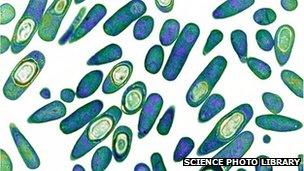Review as C.diff hospital infections rise at Glan Clwyd
- Published
C.diff rates are higher in north Wales hospitals than in other parts of the country
A rise in the number of people who contract infections while in hospital has prompted a review as NHS managers say they are improving ward cleaning.
Experts were called after an outbreak of Clostridium difficile (C.diff) at Glan Clwyd Hospital in Denbighshire earlier this year.
A report found the average number of new cases up from three a week in 2012 to eight a week in March and April.
The study called for a review of infection control arrangements.
Public Health Wales (PHW) also said more could be done to provide a safe environment for patients.
Now Betsi Cadwaladr University Health Board (BCUHB) says it has commissioned an independent review which will be led by Prof Brian Duerden, an expert in healthcare associated infection and antibiotic resistance and emeritus professor of medical microbiology at Cardiff University.
C.diff is naturally carried by some people. Infection can occur when bacteria in the gut is disrupted by the use of antibiotics to treat other infections.
The bug can then cause diarrhoea and lead to severe inflammation of the bowel which can sometimes be life threatening.
Single ward
The PHW report found seven patients identified with C.diff in 2013 had the infection recorded on their death certificate.
BCUHB said while C.diff rates have been falling over recent years in Wales, infection rates in north Wales hospitals are higher than in other parts of the nation.
BCUHB acting chief executive Geoff Lang said the numbers of new cases had been reducing since Glan Clwyd took action to prevent the infection from spreading, with affected patients put on a single ward.

C.diff is naturally carried by some people
New decontamination equipment is also being used to try to ensure other wards are cleaned thoroughly.
"These measures have been very effective and the numbers of new cases has fallen significantly over recent weeks," he said.
"However, if we are to drive down rates of Clostridium difficile and other hospital-acquired infections we recognise we need to adopt a more consistent and effective approach to managing and monitoring infection prevention and control across all our sites.
"The work carried out so far, combined with work conducted by Public Health Wales and the independent review by Prof Duerden will help us to identify ways in which we can improve."
Mr Lang said the health board was also providing updates to Healthcare Inspectorate Wales (HIW) regarding the outbreak.
- Published29 May 2013
- Published22 August 2012